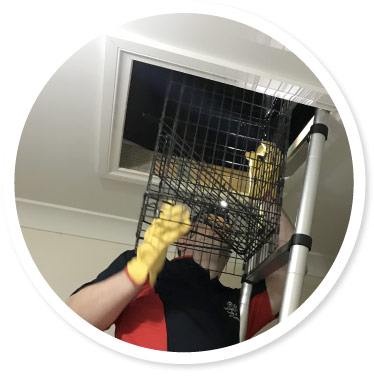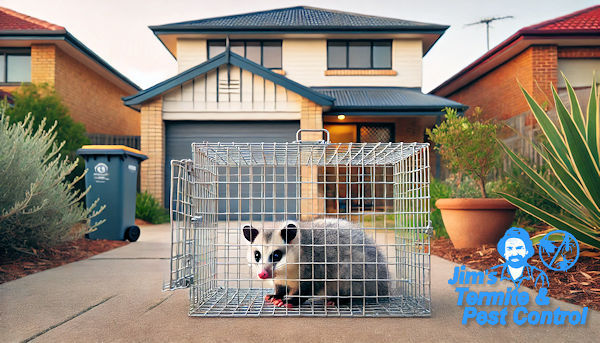At Jim’s Termite and Pest Control Queensland, we understand the challenges of managing possums. These native marsupials often seek shelter in urban areas, causing disruptions for homeowners and businesses. When it comes to trapping possums, including relocation, our team offers professional possum control services, ensuring safe and humane methods.
For any possum problems in Brisbane, Gold Coast, Ipswich, or Sunshine Coast, please call Jim’s on 131 546 today.
Read on to learn about possums, their habits, and how to manage them effectively.
Trapping Possums: What is the Process
Licences and Regulations
Trapping possums in Queensland requires specific permits. Possums are protected, and handling them without proper authorisation is illegal. Professional pest control services hold the necessary licences to trap and relocate possums legally.
Experience Matters
Possum removal is not a simple task. It requires knowledge of possum behaviour and specialised equipment. Professionals ensure humane treatment, minimising stress for the animal. They also relocate possums to approved locations, adhering to legal guidelines.

Steps in the Trapping Process
- Assessment: Technicians inspect your property to identify possum entry points and nesting areas.
- Setup: Traps are strategically placed to capture possums safely.
- Relocation: Once captured, possums are relocated to suitable habitats.
- Prevention: Entry points are sealed to prevent future infestations.
 Why Professional Trapping is Essential
Why Professional Trapping is Essential
DIY trapping methods often fall short. Without proper training, handling possums can lead to injuries or legal repercussions. Professionals have the expertise to manage the process safely and get rid of possums efficiently. They also ensure compliance with all wildlife protection laws.
What Are Possums?
Possums are nocturnal marsupials native to Australia. They are known for their bushy tails, large eyes, and sharp claws. These creatures are excellent climbers, often seeking refuge in trees, roofs, and dark crevices.
In Queensland, two main species are commonly found: the Common Brushtail Possum and the Common Ringtail Possum. Each has unique behaviours and habitat preferences. Understanding these differences is essential for effective possum management.
Types of Possums in Brisbane and Queensland
Common Brushtail Possum
The Brushtail Possum is the larger of the two species. It has a thick bushy tail and thrives in urban areas. This possum adapts well to human environments, often nesting in roof cavities.
Common Ringtail Possum
Smaller and more elusive, the Ringtail Possum has a distinctive prehensile tail. It prefers dense foliage and is less likely to enter homes. However, it may still be found in suburban gardens.
Both species are protected under Queensland law, making it illegal to harm them. This protection necessitates careful handling when managing possum infestations.
Are Possums a Health or Safety Risk?
Possums can pose several risks to homeowners. While they are not typically aggressive, their presence can lead to health concerns. Possums may carry parasites such as ticks and fleas. Their droppings can also spread harmful bacteria.
Additionally, possums can cause significant structural damage. They often gnaw on electrical wires, insulation, and wooden beams. These behaviours increase the risk of electrical fires and costly repairs.
What Attracts Possums?
Possums are drawn to areas with abundant food and shelter. Key attractants include:
- Fruit Trees and Gardens: Possums feed on fruit, flowers, and leaves.
- Pet Food: Leftover pet food outside can entice possums.
- Warm Shelter: Roof spaces and garages provide safe nesting spots.
Reducing these attractants can help deter possums from entering your property.
How to Discourage Possums
Preventing possum problems involves making your property less inviting. Start by sealing any entry points. Inspect your roof and repair gaps or holes. Use possum-proof mesh on vents and chimneys.
Next, manage food sources. Cover compost bins and secure rubbish bins tightly. Remove fallen fruit from your garden regularly.
Installing possum deterrents, such as motion-activated lights or sprinklers, can also discourage their presence. These measures help create an environment where possums are less likely to settle.
FAQs About Possums and Possum Traps
Why Are Possums Protected in Queensland? Possums are native wildlife, playing a vital role in the ecosystem. Their protection ensures population stability and biodiversity. Queensland laws prohibit harming or relocating possums without permits to safeguard their wellbeing. How Can I Tell if I Have Possums in My Roof? Signs include thumping noises at night, droppings, and a strong musky smell. You may also notice damage to insulation or chewed wires. Visual confirmation of possums entering or leaving your roof is another indicator. What Should I Do if I Find a Possum? If you encounter a possum, avoid handling it yourself. Contact a licensed pest control service for assistance. Professionals can trap and relocate possums safely, ensuring compliance with legal requirements. How Long Does the Trapping Process Take? The trapping process typically takes a few days. However, this can vary based on the possum's behaviour and the severity of the infestation. After trapping, technicians will take steps to prevent future entry. Can Possums Return After Being Relocated? Relocated possums may try to return to their original nesting site. To prevent this, professionals seal entry points and install deterrents. These measures reduce the likelihood of repeat infestations. Are Possum Traps Safe for Pets? Possum traps used by professionals are designed to be safe and humane. However, technicians place traps in areas inaccessible to pets to avoid accidental captures. This ensures the safety of both wildlife and domestic animals.
Act Now!
Protect your property from possum invasions with expert help. At Jim’s Termite and Pest Control Queensland, we offer safe and effective possum management services. Call us today on 131 546 for professional advice and assistance. Let us help you regain peace of mind with humane possum solutions.

